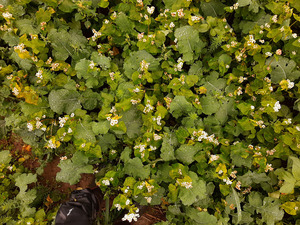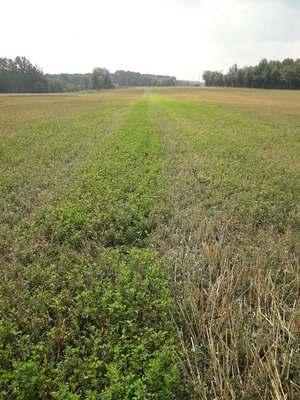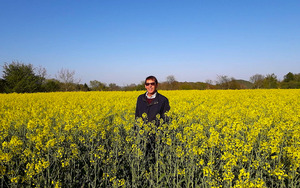Producing food for human consumption while enhancing arable land: crop diversification in an organic farm in Wallonia
Philippe Mattez is a farmer in a region of Wallonia with loamy soils. In this region, the landscape is characterized by open fields where the main crops grown are cereals, potatoes, sugar beet, maize and rapeseed. Twenty years ago, Philippe Mattez decided to follow the organic farming production specifications. He gradually diversified his production, introducing new crops, particularly for human consumption, trying new combinations and expanding cover crops and conservation agriculture practices. He is now producing potatoes, vegetables (carrots, onions, pumpkin, chicory), cereals (oats, spelt, barley, etc.), legumes (lentils, peas, alfalfa), herbs (basil, parsley) and other seeds (quinoa, rapeseed). He has also recently planted fruit-bearing hedges.



Problem encountered
In the late 90's, Philppe Mattez was facing various problems and fundamental questions on cropping systems: low income from agricultural production on a small farm, low prices of cereals, source of synthetic fertilizers, their price, farmer's health, soil quality and ecological impact of farming practices. This led him to look for solutions to produce effectively, in a clean way and to keep the farm alive.
Currently, he is still facing financial and climatic risks. Furthermore, the fluctuating market makes it impossible to predict the demand from one year to the other.
Solutions implemented
Philippe has been searching in every direction looking for nitrogen self-sufficiency, keeping soils clean by controlling weeds, improving fertility and managing pests and diseases. Two main strategies are explored to keep his system working: trying innovative farming practices and looking for new opportunities, new crops, and new markets.
As an innovative farmer of agronomic practices, he converted to the organic specifications for a first plot in 1997 and soon after for all of the agricultural area on his farm. Twenty years later, he associates this transition with benefits to the environment, and especially to his soil. Soil microorganisms are not harmed by synthetic products and soil life is enhanced by the organic matter used as a nutrient source. Searching for a sustainable source of free nitrogen, he also introduced legumes within his complex rotations, both as main crops, cover crops, and intercrops. Philippe takes care of his soil health and quality by applying techniques from conservation agriculture, maximizing the soil cover, especially between cropping seasons, tilling as little as possible and extending crop rotations.
He now grows more than 10 different crops on the farm and can thus make very long and diversified rotations. Growing new crops drives him to find new opportunities and new markets for his products: quinoa, littlespelt, and a combination of lentil-camelina or lentil-spelt.
Challenges encountered
The crops need to mature at the same time and, once harvested, they need to be sorted. However, sorting machines represent high investment.
Having a lot of vegetables prevents him from totally stopping tillage. He must implement other practices such as mineralisation of organic matter each time they till and applying a lot of compost (manure and green waste composts).
Another challenge is the destruction of cover crops that are not killed by the frost when you try to limit tillage, as well as crop residue management. He thus tries to develop new practices in order to combine those constraints with no-tillage.
Why was it successful?
Crop diversification helps him spread the risks by promoting biodiversity to manage weeds, pathogens and pests. Having several crops also helps him mitigate the fluctuation in prices from one year to the other. Furthermore, he has found intercropping generally leads to higher yields than single crops.
In general, his system is working quite well thanks to his good relationship with the buyers and his ability to negotiate fair prices. By basing his rotation on food rather than feed production, he also reaches a better market and gets better prices. Crops for human consumption are trendy and represent a growing market, for which there is a growing demand. It is a niche to be occupied because if local farmers don't grow crops following consumers’ choices, some of these agricultural products will be imported.
His curiosity also helped him learn and implement new practices and reach new markets. His critical thinking allowed him to question his system. It was a step by step process that started when he was still a student. He did not hesitate to travel to learn about new practices.
 tap and then scroll down to the Add to Home Screen command.
tap and then scroll down to the Add to Home Screen command.